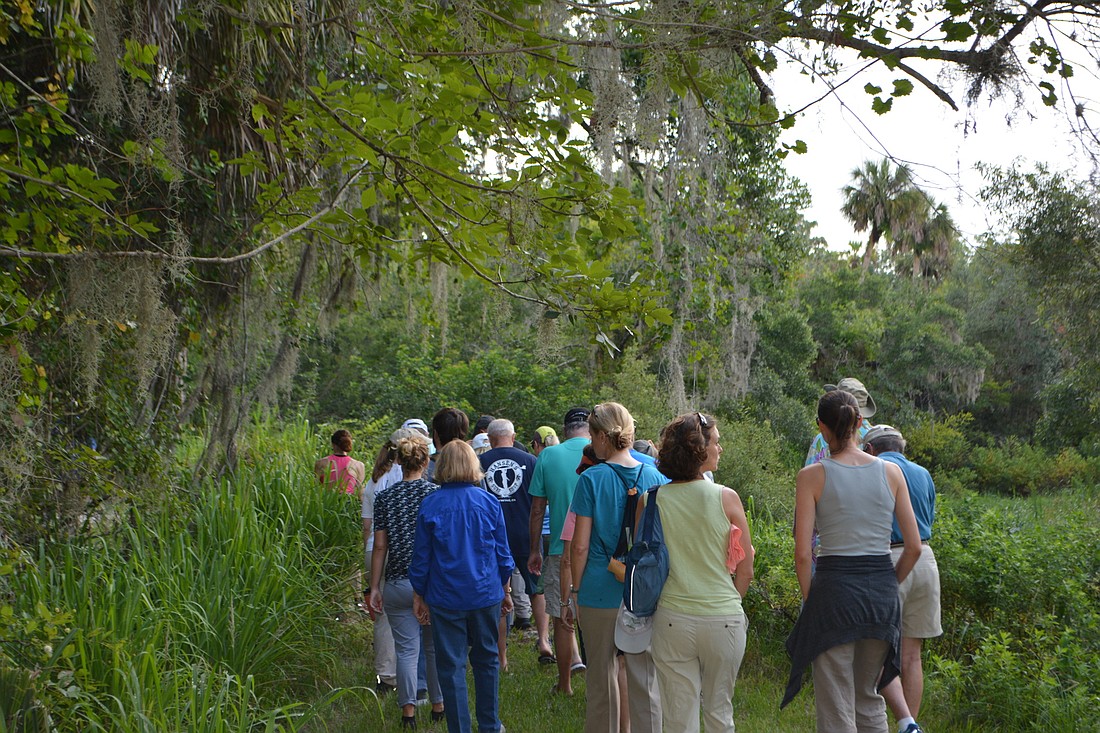- December 17, 2024
-
-
Loading

Loading

It was 40 years ago when Dick Eckenrod and a friend found their slice of heaven along the Manatee River in Parrish.
They split two parcels, and have been happy living there ever since.
Now, though, Eckenrod, who is president of the Manatee Fish and Game Association, is worried the natural beauty of Manatee County is eroding, wiped out by constant development. He said the very thing that attracted him to the area is in jeopardy.
The Manatee Fish and Game Association and The Conservation Foundation of the Gulf Coast have become driving forces in prompting Manatee County to put a referendum — Water Quality Protection, Fish and Wildlife Habitat Preservation, and Park Ad Valorem Tax and Bonds — on the General Election ballot.
If the measure is approved, it would generate as much as $50 million dedicated to "finance the acquisition, improvement, and management of land to protect drinking water sources and water quality, preserve fish and wildlife habitat, prevent stormwater runoff pollution, and provide parks."
It would do by levying an additional 0.15 mill ad valorem tax over 20 years that would lead to the issuance of general obligation bonds.
For a home with an assessed value of $300,000, that cost would be about $45 annually, assuming all the bonds are issued at once in 2020.
Those payments go either up or down depending on the assessed value. A resident who owns a home valued at $193,378 would pay $29 a year.
Eckenrod said the Manatee Fish and Game Association formed a speakers bureau that made presentations are various groups around the county. He said the feedback is indicated the residents are in favor of passing the referendum.
"We're fairly optimistic," he said.
Manatee County commissioners on July 28 voted unanimously to have the measure placed on the Nov. 3 ballot. District 5 Commissioner Vanessa Baugh, however, does have some reservations.
"I don't care for it because it increases the millage," Baugh said.
GreyHawk Landing's George Kruse, who won the District 7 at-large commission seat in August and will be unopposed in the general election, also doesn't like the through the higher taxes.
"We put a referendum on there for people to tax themselves and say it is like a cup of coffee," he said. "The problem is that $29 is an average price. That's not retail centers or multi-family (dwellings) that will pass that tax off to the tenants."
Kruse said the topic makes it hard for anyone to be against the referendum. However, he would like the language to be more specific, such as how the money is going to be spent and whether the entire $50 million can be spent on one piece of land. He said it isn't specific about who will identify the environmentally significant land.
Kruse, who has had a lifelong career in commercial real estate finance, said he doesn't want to see a "$50 million slush fund." He also said all $50 million won't go to land since there will be debt service on the funds.
The commissioners will have the final say before any property is purchased. Baugh said they will keep in mind that just because a citizen doesn't want land developed doesn't mean the property owner wants to sell it, and that just because a parcel of land is vacant doesn't mean it needs to be purchased. She said the commissioners must make sure there is justifiable purpose for buying the land.
Both Kruse and Baugh said the county has so much money in reserve (more than $500 million) that it makes it heard to ask residents to tax themselves.
Proponents note that 3.5% of the county’s reserve funds are available for discretionary and the remaining funds are limited by state law for designated uses.
But Baugh also noted the county found $32.5 million Oct. 13 to buy property at State Road 64 and Lena Road to build a new operations center. She wonders if the county could come up with the funds to buy environmentally significant land without raising taxes.
County Administrator Cheri Coryea said she couldn't comment on the referendum but she did not that the normal process for this kind of land purchase by the county will include required public hearings for community review and input.
The Environmental Land Management and Acquisition Advisory Committee (ELMAAC) was formed in 1993 by the commission, perhaps with this kind of task in mind. Eckenrod said he has attended ELMAAC meetings for years, However, Eckenrod noted the committee hasn't been that active because the county didn't have the kind of funding it is proposing to buy environmentally significant lands.
ELMAAC's stated purpose is to advise the commission on matters related to environmental land acquisition and management, and to develop a county-wide inventory of environmentally sensitive lands.
Manatee County ranks 53rd of 67 Florida counties in environmentally significant land preserved at 12% as noted by the Florida Natural Areas Inventory.